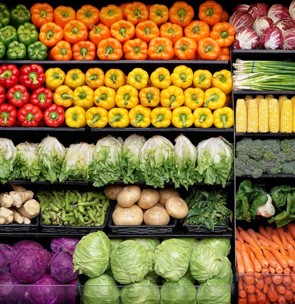

Published on Jul 19th, 2022

Nature always blesses humans more than they desire. Organic food production methods promote nature-friendly tactics to confirm that the environment positively influences our well-being. The freshly organic diet paves the way for exquisite physical and mental growth. To live well is the primary initiative, the world is tirelessly working upon.
Organics are attributed for vegetables, fruits, meats, and their agricultural growing method that exactly join the caliber connected to pesticide, fertilizer, and hormone use, soil quality, and animal raising practices, implementing the rules declared by the U.S Department of Agriculture (USDA), a national organic program for certification.
Genetically modified organisms (GMO) are developed by purposefully changing the genetic formation of a plant or animal in a manner that could never happen as a matter of course. The maximum quantity of GMO crops nowadays available on the market have been genetically engineered to initiate their own pesticides and withstand herbicides that ordinarily would destroy them. Farmers take the help of herbicides to get command of weeds. Non-GMO certified products have been proved to have been expanded and processed without genetic alteration.
‘’Organic is always non-GMO’’. This clearly indicated that it is constant for the producer who followed the organic system plan, will not have intentionally used genetic engineering or GMOs. The application of genetic engineering, or genetically modified organisms (GMOs), is prohibited in organic products.
This proves that organic farming practices are entirely free from GMO involvement. To reach the (USDA) organic regulations, farmers and processors must be verified they aren’t making use of GMOs and that they are saving their products from connecting with GMOs, from beginning to end.

Organic consists of three grades.
‘’100% Organic’’ defines that all ingredients are organic and no non-organic ingredients or processing support are utilized.
‘’Organic’’ shows that 95% of ingredients are organic and the remainder of ingredients are allowed for use in organics. For a product to hold the (USDA) organic label, an accredited third-party certification body must verify that the product deserves to be believed 100% organic. The ‘’organic’’ or ‘’made with organic’’ both claims will be understandably labeled but not as (USDA) 100% organic.
A ‘’Made with Organic’’ claim may seem on a product that holds in:
1- Minimum 70% organic ingredients, with the remainder of ingredients, declared for use in organic products.
2- Up to three organic ingredients or food groups.
These three organic product claims (USDA organic, organic, or made with organic) may use the monogram of the certification body covered by the distributor or manufacturer information on the label.
Promising to be non-GMO, revealing the organisms in the food are not genetically modified, is a little biased. In actuality, the GMOs travel. Pollen drifts on the wind and by the movement of wildlife.
Genetically modified organisms (GMOs) once let out into the environment cannot be brought back. Due to this, non-GMO project caliber outlines prominently show the necessity for (GMO) cut-off, adding ongoing testing of all capital ingredients observed high risk for being GMO. Rate each product, rather than the system that produced it, recognize contamination and fraud, plus how to error-free an issue. When you notice the non-GMO project butterfly certification mark, you can be relaxed and understand that the food you are eating is absolutely non-GMO.
About six-in-ten U.S. adults younger than 30 (61%) say that organic produce is better for health than conventionally grown varieties, as do (57%) of those ages 30 to 49. In contrast, (45%) of seniors (those ages 65 and older) say organic produce is healthier, according to a new Pew Research Center survey.
Younger people are more convinced to choose organic food instead of conventional one. However, they are more aware of how organic food is good for the environment and their health. It is a bit relaxing that the new generation is giving a major favor to shift themselves entirely to an organic diet.
The curiosity to try healthy and tasty food leads youngsters to an organic diet. Organics are more flavorful than conventional meals that’s why youngsters are highly encouraged to make them as a part of their life.
As much research has been done on organic vs conventional food, it’s easier to access the relevant and authentic knowledge about what sort of diet is great for us. It is recommended by nutritionists as well to opt for non-GMO food because of its exceptional qualities.

The preference for organic and non-GMO food is rising day by day. We can expect that in the future people will be totally dependent on organic food. It will become a priority.
BackBe the first to know about new products, events and offers.